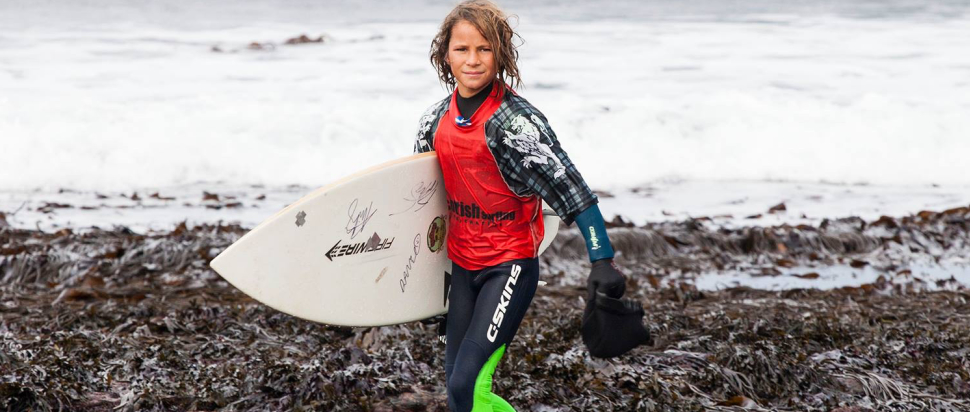Surf's Up: Martyn Robertson on Ride the Wave
Glasgow-based documentarian Martyn Robertson brings his first feature film, Ride the Wave, to Glasgow Film Festival this month. We talked to him about life among the surfers and what it means to bring Scottish stories to a wider audience
Ben Larg grew up surfing the great west swells near his home in the Isle of Tiree. When he was 12 years old, he was crowned Scotland’s Under-18 Surfing Champion. Martyn Robertson’s Ride the Wave follows this boy wonder into his early teenage years as he attempts to break into the big leagues of international surfing. The project sprang from a personal connection. “Ben’s father, Marti, one of his brothers was at school with me and I kept in touch with the family,” Robertson tells us when we meet him a few days after screening his film at London Film Festival. “Alongside that, I was watching lots of the press about Ben’s rise to success as a young surfer.” Robertson was particularly struck by an anecdote Marti had told him about Ben’s mother lying on the beach and staring at the sky, unable to watch her son risking his life on 12-foot waves.
Robertson began following Ben and his family to surfing competitions around the world, as well as filming him during training on Tiree. The result was a level of intimacy that helped Ben and his family to feel comfortable baring their souls to the camera. “We just became part of his squad. You get to know each other very quickly, and we became great friends ultimately, and still are. At the end of the process, when we stopped following them, we would get phone calls from Ben saying ‘Oh we’re really missing you, it seems a bit odd that you’re not in the team anymore.’ Where all these other teams had dietitians and physios, Ben had a film crew and nothing else.”
That closeness extended to Ben’s family. One of Ride the Wave’s most compelling aspects is the pride and concern Ben’s parents show for their son. The relationships between the family make the film about more than surfing; it’s about the joy of seeing a child grow up, and the pain of letting them go.
Filming wasn’t always without challenges, however. Having followed Ben to Japan for a major surfing competition, Robertson found that his cameras had arrived… but none of his other bags. “We’d done a press thing leaving Edinburgh for a sponsor, where we’d all have kilts on, like the Scottish team,” he recalls. “So, we got to Japan and in the end, we had to wear kilts for like 8 days! We looked absolutely ridiculous as this film crew kicking about on the beach with all these tanned, fit, beautiful people and us rolling around in Scotland t-shirts and kilts feeling a bit smelly.” Nevertheless, there were some upsides. “The mayor of the town showed us around on behalf of the surfing competition, he hosted a meal and treated us to local delicacies.”
The surfing scenes themselves also proved challenging. “Surfing’s not like a tap, you can’t turn it on and off. You can be filming for four days, 12 hours a day and get nothing. And we did. You need patience, you need a packed lunch, and you need to keep wrapped up and warm.” Unfortunately, the unpredictable nature of the sport meant that filming could be both expensive and ineffective. Robertson spent the lion’s share of the budget on filming Ben’s first attempt at one of Ireland’s notoriously dangerous big waves, hiring jet skis, cameras in the air and in the water, only for Ben to decide that it would be unsafe. The finale itself was filmed on two handheld cameras from land, and yet it still lands as effectively as any big-budget blockbuster.
“Seeing it for the first time in front of an audience at the London Film Festival, it was magic to hear how a 200-strong audience reacted to the film. I was just a little surprised about just how warm the audience was to the story. Marti has quite a thick Dundonian accent and sometimes can be a little tricky to understand, but most people in the audience said it wasn’t a problem for them, they really understood the essence of what the story was and connected with them as a family.”
Robertson’s second feature, which is currently in development with Sky, will follow a former British champion show-jumper who came from a troubled background and now saves horses’ lives. However, he’d love to return to Ben’s story at some point in the future. “Already, Ben’s life has changed from when we finished filming til now. I think that’s partly the pandemic, but he’s also taking an interest in girls, doing all the things that young people start to do, so I think he’s a slightly different character now. His life will be quite interesting in a few years’ time.” For now, Robertson’s still on the film festival circuit, riding his own wave of success, wherever it may take him.
Ride the Wave screens 10 & 11 Mar at Glasgow Film Festival
